- 3 hours ago
- Middle East
At least 93 people have been killed in three car bomb attacks in the Iraqi capital Baghdad, police and medics say.
The deadliest struck a market in the mainly Shia Muslim area of Sadr City during the morning rush hour, killing 64 people and wounding 87 others.
In the afternoon, two suicide bombers targeted police checkpoints in the northern district of Kadhimiya and in Jamia, in the west, leaving 29 dead.
So-called Islamic State (IS) has said it was behind all three attacks.
The Sunni jihadist group, which controls large swathes of northern and western Iraq, has frequently targeted Shia, whom it considers apostates.
The target of Wednesday's first bombing was the busy market in Sadr City.
Police and witnesses said the explosives were hidden under fruit and vegetables loaded on a pick-up trick.
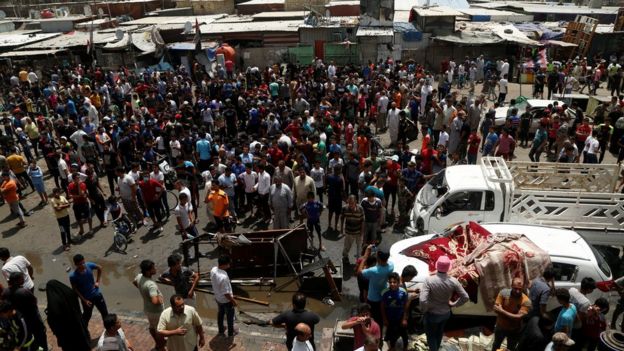 REUTERS
REUTERS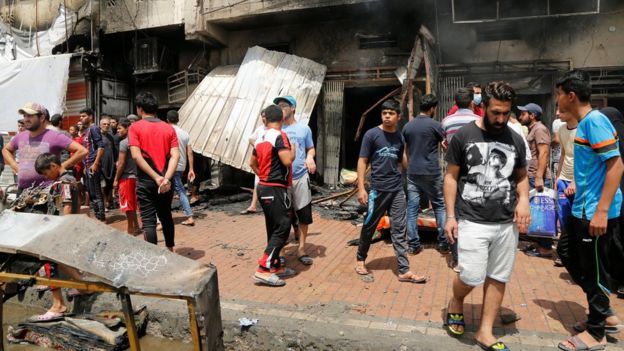 REUTERS
REUTERS
They said the driver disappeared after parking the vehicle in the market, shortly before the massive blast turned the area into an inferno.
"It was such a thunderous explosion that jolted the ground," Karim Salih, a 45-year old grocer, told the Associated Press. "The force of the explosion threw me for meters away and I lost consciousness for a few minutes."
Many victims were women inside a beauty salon, including several brides who appeared to be getting ready for their weddings, police sources told Reuters news agency. The bodies of two men believed to be grooms were found in an adjacent barber shop, they added.

Sadr City, a huge, largely Shia suburb, has frequently been the target of bomb attacks by Sunni extremists but this is one of the worst, says the BBC's Jim Muir in Iraq.
IS said one of its suicide bombers had carried out the attack, and that it was aimed at Shia militiamen, an account that seems to be at odds with reports from the scene, our correspondent adds.
Hours later, a suicide car bomb exploded outside a police checkpoint in Kadhimiya, a mostly Shia district that is the location of an important shrine, officials said.
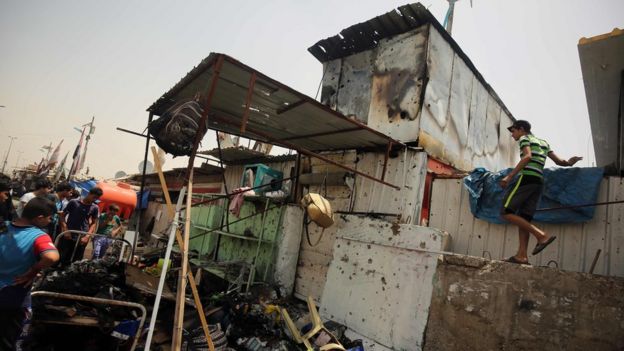 AFP
AFP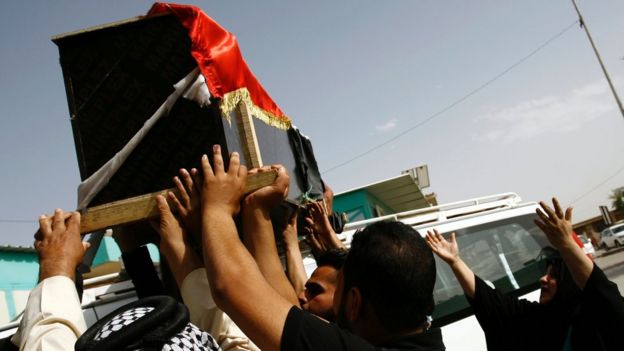 AFP
AFP
Both police officers and civilians were among the at least 17 people who died and 43 who were injured, officials said.
At around the same time, another suicide car bomb targeted a checkpoint in the Jamia district, which is predominantly Sunni, killing 12 people and wounding 31.
Political turmoil
Our correspondent says the bombings come in the midst of an acute political crisis in Baghdad, with parliament unable to meet and the government effectively paralysed by factional disputes.
In the aftermath of the Sadr City bombing, he adds, angry survivors blamed the politicians for failing to protect them and ensure security.

Recent IS deadly bombings
 REUTERS
REUTERS
March 2016: Suicide attack in a football match in the city of Iskandariya, in central Iraq, kills at least 32 people. Many of the dead were young boys who had been in a trophy ceremony.
March 2016: Fuel tanker blown up at checkpoint near Hilla, killing 47.
February 2016: Twin suicide bomb attack at Sadr City market kills 70.
August 2015: Truck bomb explodes at market in Sadr City, killing 67.
July 2015: Car bomb hits market in town of Khan Bani Saad, killing 120.

"Politicians are fighting each other in parliament and government while the people are being killed every day," Hussein Abdullah, the owner of an electrical appliances store who suffered shrapnel wounds, told AP.
UN envoy to Iraq Jan Kubis warned on Friday that the political impasse was only serving the interests of IS and urged political leaders and civil society to work together to resolve it.
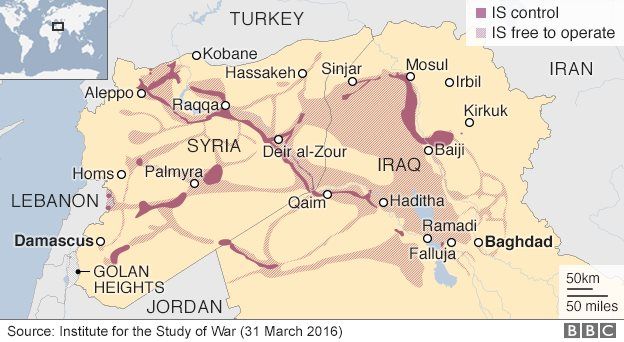
Iraqi pro-government forces, backed by US-led coalition air strikes, have made gains in the western province of Anbar and are preparing for an offensive to retake the northern city of Mosul, but have been unable to prevent attacks in Baghdad.
A government spokesman announced on Wednesday that IS now occupied 14% of Iraqi territory, down from 40% in mid-2014, according to Reuters.
However, the figure appeared to differ with that given by US Secretary of State John Kerry late last month, who told Alhurra TV that IS had lost 44% of its territory.
The UN says at least 3,379 Iraqis were killed in acts of terrorism, violence and armed conflict in the first four months of this year. A total of 741 died in April.

Why does IS target Shia?
The group considers Shia to be irredeemable apostates subject to punishment by death.
Powerful Shia militias, which IS said it had targeted in Wednesday's attack, have also played a vital role in helping Iraqi government forces drive militants out of areas they captured in mid-2014.
Prime Minister Haider al-Abadi has in the past said the bombings in the capital are "desperate" attempts by IS militants to retaliate for the territorial losses, and analysts say they may increase in frequency as government forces advance.
What can't the government prevent attacks in Baghdad?
Vehicle scanners at the entrances to Baghdad have helped reduce the number of co-ordinated car bomb attacks since late 2014. But IS has changed tactics in response, and instead used suicide bombers and bombs planted in public spaces.
The security establishment is also plagued by corruption, and officers are allegedly easy to bribe. Expenditure on security has also reduced, with the government's finances strained by the cost of the war against IS and declining oil revenue.
The authorities have also struggled to secure rural areas ringing the capital - the so-called "Baghdad belt" - where militants are known to shelter. Local Sunnis, many of whom have suffered abuses at the hands of the Shia-dominated security forces or were alienated by the sectarian policies of Mr Abadi's predecessor, have been accused of aiding IS.

No comments:
Post a Comment